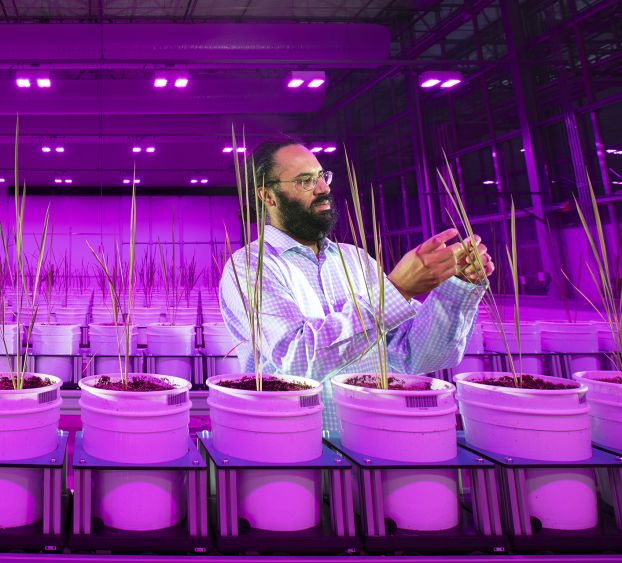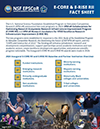Research Infrastructure Improvement Program
EPSCoR uses three major investment strategies to achieve its goal of improving the R&D competitiveness of researchers and institutions within EPSCoR jurisdictions. To see if you are eligible to apply, view the EPSCoR Criteria for Eligibility. Read about current opportunities below:
The E-CORE RII program supports jurisdictions in building capacity in one or more targeted research infrastructure cores that underlie the jurisdiction's research ecosystem. Based on the evidence-based and self-identified need of the jurisdiction, capacity building supported by E-CORE RII may include (but is not limited to) development, enhancement, and/or sustainability of: jurisdiction-wide research administration; research facilities; higher education pathways; STEM education (K-16) pathways; broadening participation; workforce development; national and global partnerships; community engagement and outreach; economic development and use-inspired research; and/or early career research trainee pathways. E-CORE RII projects must be designed to support the sustainability of the infrastructure core(s) beyond the award period. In E-CORE RII’s support of one or more research infrastructure cores in an EPSCoR-eligible jurisdiction, the program will also support the development and growth of new jurisdictional networks, and the leveraging of existing jurisdictional networks, that can drive demonstrable and sustainable impact to advance the jurisdiction-wide research ecosystem.
Through the fostering of STEM research ecosystems and research capacity pathways across institution types and sectors in a jurisdiction, E-CORE RII aims to support jurisdiction-wide research infrastructure cores based on jurisdictional variability. A jurisdiction’s science, technology, engineering, and mathematics (STEM) research ecosystem encompasses all new and ongoing interactions among its research environment, researchers, stakeholders, and STEM research activities to improve knowledge, or contribute to end-use or societal impacts in the jurisdiction.
See Solicitation 23-587 and view a recent E-CORE presentation for more information.
Read EPSCoR's new Dear Colleague Letter to learn more about Planning Grants for E-RISE and E-CORE.
The E-RISE RII program supports the incubation of research teams and products in a scientific topical area that links to research priorities identified in the submitting jurisdiction’s approved Science and Technology (S&T) Plan. E-RISE RII invites innovative proposals that will lead to development and implementation of sustainable broad networks of individuals, institutions, and organizations that will transform the science, technology, engineering and mathematics (STEM) research capacity and competitiveness in a jurisdiction within the chosen field of research. E-RISE RII projects must be designed to incubate (i) areas of research capacity building within a chosen research topic; (ii) development of a skilled workforce that is relevant to the project and its outcomes; (iii) promotion of diversity, equity, access, and a culture of inclusion of different types of academic institutions (see below) and non-academic sectors (e.g., industry and government); (iv) integration of the research with societal impacts in a timebound manner; and (v) sustainability of a clear pathway towards preserving the resulting research incubator's team and products beyond E-RISE RII funding.
See Solicitation 23-588 and view a recent E-RISE presentation for more information.
Read EPSCoR's new Dear Colleague Letter to learn more about Planning Grants for E-RISE and E-CORE.
Dear Colleague Letter
Announcement of Topic for the Fiscal Year 2025 and 2026 EPSCoR Research Improvement Infrastructure-Focused EPSCoR Collaborations (RII-FEC) Program
The RII-FEC program (formerly known as “EPSCoR Track-2 program”) builds interjurisdictional collaborative teams of EPSCoR investigators in Science, Technology, Engineering, and Mathematics (STEM) focus areas consistent with the current National Science Foundation Strategic Plan. Projects are investigator-driven and must include researchers from at least two EPSCoR eligible jurisdictions with complementary expertise and resources necessary to address challenges, which neither party could address as well or as rapidly independently. RII-FEC projects have a comprehensive and integrated vision to drive discovery and build sustainable STEM capacity that exemplifies individual, institutional, geographic, and disciplinary diversity. The projects’ STEM research and education activities seek to broaden participation through the strategic inclusion and integration of all individuals, institutions, and sectors. Additionally, EPSCoR recognizes that the development of early-career faculty from backgrounds that are traditionally underrepresented in STEM fields is critical to sustaining and advancing research capacity. The integration and inclusion of Minority-Serving Institutions (MSIs), women’s colleges, Primarily Undergraduate Institutions (PUIs), and two-year colleges is a critical component of this sustainable STEM capacity.
Letter of Intent
Letter of Intent due date(s) (required) (due by 5 p.m. submitter's local time): December 17, 2024
Due Date
Full Proposal due date(s) (due by 5 p.m. submitter's local time): January 28, 2025
RII Track-2 Focused EPSCoR Collaborations (FEC) provides two types of collaborative awards:
- Up to $1 million per year for up to four years for collaborations between two EPSCoR jurisdictions
- Up to $1.5 million per year for up to four years to a consortium of three or more EPSCoR jurisdictions.
NSF EPSCoR will host multiple office hour sessions where PI’s may meet with program officers to address questions and / or seek clarification. Please submit questions in advance to jcolom@nsf.gov
Office Hour Dates & Times:
While real time captioning will be available, requests for additional accommodations may be sent to jcolom@nsf.gov 14 days in advance.
You must register to attend. After registering, you will receive a confirmation email containing information about joining the webinar.
View the Track-2 Webinar for the 2024/2025 Competition
Full proposals due April 22, 2024, and second Tuesday in April annually thereafter
EPSCoR RII: EPSCoR Research Fellows provides awards to build research capacity in institutions and transform the career trajectories of investigators and further develop their individual research potential through collaborations with investigators from the nation's premier private, governmental, or academic research centers. The fellowship provides opportunities to establish strong collaborations through extended or periodic collaborative visits to a selected host site. There are two sub-tracks:
- RII Track-4: NSF - provides up to $300k
- RII Track-4: @NASA - provides up to $360k
Office Hours Registration is available for sessions on the following dates:
- Wednesday, December 11, 2024
- Tuesday, January 21, 2025
- Thursday, February 13, 2025
- Friday, March 7, 2025
- Monday, March 24, 2025
All Office Hours for the program will be held from 3pm-4pm Eastern Time.
Watch webinar on EPSCoR Research Fellows
The NSF EPSCoR Graduate Fellowship Program (EGFP) provides an opportunity for applicants who received the distinction of GRFP Honorable Mention no more than three years before the proposal due date to be named NSF EPSCoR Graduate Fellows and obtain financial support for their graduate education at an institution in an EPSCoR jurisdiction. EGFP aims to enhance the capacity and competitiveness of EPSCoR jurisdictions by providing funding to graduate degree-awarding institutions to support NSF EPSCoR Graduate Fellows as they pursue graduate degrees in the disciplines specified by the NSF Directorates and Office that are participating in the EGFP funding program. Fellows may pursue degrees in field that differ from the field or sub-field of study that the GRFP Honorable Mention recipients previously listed in their GRFP application.
See Solicitation 24-588 for more information.
NSF EPSCoR E-CORE RII and E-RISE RII Fact Sheet
(PDF, 4.63MB)
An overview of institutions and projects funded by two new NSF EPSCOR programs: E-CORE RII and E-RISE RII.

Research supported by National Science Foundation grant OIA 1736192.
Learn more in the NSF News Release NSF EPSCoR awards new projects to help understand connections between genes and organisms' characteristics.
Date image taken: unknown; date originally posted to NSF Multimedia Gallery: Dec. 13, 2017
Credit: University Communication / University of Nebraska-Lincoln
Co-funding of disciplinary and multidisciplinary research
EPSCoR often co-funds proposals submitted to other NSF programs if the applicant is located in an EPSCoR jurisdiction. The proposals selected for this funding have been merit reviewed and recommended for award, but could not be funded without the combined support of EPSCoR and the co-funding directorates. Co-funding leverages EPSCoR investment and facilitates participation of EPSCoR scientists and engineers in NSF-wide programs and initiatives.
Workshops and outreach
EPSCoR funds workshops, conferences and other community-based activities to explore opportunities in emerging areas of science and engineering, and to share best practices in strategic planning, diversity, communication, cyberinfrastructure, evaluation and other areas of importance to EPSCoR jurisdictions (See NSF 19-588).
EPSCoR also supports outreach travel that enables NSF staff from all directorates and offices to work with the EPSCoR research community on NSF opportunities, priorities, programs and policies. This travel better acquaints NSF staff with the science and engineering accomplishments, ongoing activities and new directions and opportunities in research and education in EPSCoR jurisdictions.


